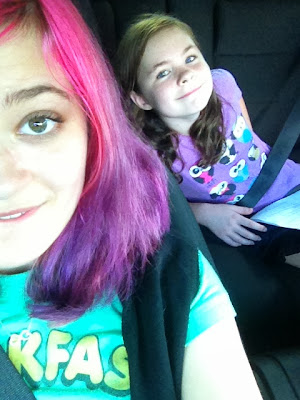I'm not really sure when I first became interested in Japan, but it was probably when I was really little. I believe my interest probably comes from my dad, who has something of a
fascination with Japanese culture. While he was walking around the house exclaiming random Japanese words and swinging his (very expensive) katana around in the backyard all my life, I must have at some point absorbed the excitement.
My personal interest, however, most likely blossomed in around 8th grade, when I discovered anime. With a strong interest in visual art, I was immediately attracted to the often stunning and symbolic art that can be found in anime, and I became curious about the culture that developed it. Why had this artistic form of story-telling developed in Japan and not here? Where did the difference come in? As I explored these questions, I began to realize that a lot of the differences contributed to my personal fascination with Japanese culture. However, this isn't exactly what got me interested in the Japanese language, per sé.
There is an age-old conflict among foreign anime fans, and that is: Do you watch dubs or subs? That is, do you watch anime dubbed over in your native language, or do you watch it in Japanese with subtitles? Being that I'm not the fastest reader, and that more than anything else, it is the visual art of anime that attracts me, I am generally someone who watches dubs--a preference that I am often scorned for. Many foreign anime fans consider dubbing a destructive process, which removes essential elements of the original work. These people are purists. However, to be honest, the Japanese voice actors tend to be better than the American ones. As such, there are times where I'd prefer to watch an anime with it's original audio--not to mention the fact that many anime shows are not even available with English dubs. Early on, I decided that to overcome this issue, I ought simply learn Japanese. Of course, this is easier said than done.
While I
decided early on, it wasn't until recently that I actually began to
act on this notion. This being said, from the moment I decided to learn the language, I started paying more attention to it in the shows that I watched. To accurately summarize my opinion, I can only say that it sounds
awesome. Just from listening, it was easy to get the gist of how complex of a language it is. And apart from that, the sounds are--how to put it--pleasing? I love the way Japanese sounds. It's like this rush of clear, smooth sounds that somehow form together to convey thoughts. Thinking back, it is likely this admiration that made it difficult for me to actually begin learning. The idea of actually understanding Japanese was intimidating.
Eventually, in around eleventh grade, I actually began trying to learn, and I have been ever since. Learning on my own was rough. I used the MIT online courses, but there were a lot of nuances that I missed (I at one point had to completely relearn Katakana and Hiragana because the site I used to learn them didn't teach stroke order). Anything else I learned came from anime and chatting with Japanese people online (consequently, I gained a lot of knowledge of colloquial phrases, but didn't know how to express those thoughts politely). I walked away from my senior year of high school without much more than a shakey foundation in the language, but honestly I was proud of myself for having accomplished even that.
Now I'm taking my first real class in Japanese, and I could not be more thrilled. There are all kinds of details I'd never fully grasped that are now made clearer by the presence of an actual teacher. Not to mention, an excuse to sit in a room for an hour a day and just
speak Japanese with people is invaluable to me. I've had a blast these past four weeks, and I finally feel like I'm getting a solid footing in this language. I can't wait for the semesters more of class I have to come!!










